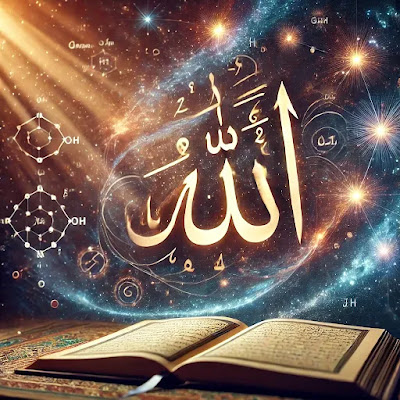A Shia Perspective on the Intersection of Genetics, Spirituality, and Divine Wisdom
Welcome to our latest exploration on the Genetics in Islam blog. Today, we embark on a fascinating journey to explore the profound relationship between Allah’s names and their potential influence on our genetic makeup and spiritual health, grounded in the teachings of Shia Islam.
Our Approach: A Step-by-Step Tafsir and Genetic Analysis
In this post, we will begin by examining the foundational phrase of the Quran, "Bismillah hir-Rahman ir-Rahim", focusing on its deep meanings through the lens of tafsir (exegesis) and the wisdom provided in Shia hadiths. Alongside these theological insights, we will explore the possibility that these divine names may also offer insight into the genetic and epigenetic influence that shapes human beings—connecting spirituality with biology.
We begin by looking at how this powerful phrase isn’t just an invocation for any task—it’s a gateway to understanding Allah’s mercy and divine presence in all facets of our lives, including the structure of our bodies and DNA.
Breaking Down the Divine Names through Shia Teachings:
Bismillah (بِسْمِ ٱللَّهِ) - "In the name of Allah":
In Shia tradition, this phrase signifies the acknowledgment of divine sovereignty over all creation. From a spiritual and genetic perspective, it reminds us that our physical forms, including our genetic makeup, belong to Allah, and it is by His divine will that we are structured in a particular way. The act of invoking Bismillah aligns our intentions with divine guidance, including in matters related to our health and well-being.Al-Rahman (ٱلرَّحْمَٰنُ) - "The Most Gracious":
According to Shia teachings, Allah’s mercy extends to every creation, providing not only physical sustenance but also spiritual nourishment. This divine grace might influence our genetic inheritance, ensuring the transmission of health and strength throughout generations. In the context of epigenetics, Al-Rahman might represent the nurturing force that allows the genetic traits of mercy, compassion, and generosity to be passed down through generations.Al-Rahim (ٱلرَّحِيمُ) - "The Most Merciful":
In Shia thought, Al-Rahim is the mercy that is specifically extended towards the believers. This divine attribute ensures that our spiritual growth and genetic potential are preserved. The specific mercy extended through Al-Rahim could guide how we maintain health, protect our DNA, and express higher levels of consciousness, especially in the context of spiritual practices that enhance our connection to Allah.
Shia Hadiths and the Divine Influence on Genetics
The Shia teachings also emphasize that Allah has provided divine guidance in every aspect of life. Imams and the wisdom passed down through their sayings can offer us additional insight into the relationship between our spiritual practices and genetics. For example, Imam Ali (as) in his sayings often emphasizes the importance of purification of the soul, which could be directly related to how spiritual actions (like reciting Allah’s names) might influence our epigenetic expression—shaping who we are not just spiritually but physically.
Hadiths to Reflect On:
Imam Ali (as) said: “He who purifies his heart, purifies his body.”
This highlights a fundamental connection between the spiritual state of the heart and the physical well-being of the body, possibly affecting genetic expression in ways we can’t yet fully comprehend. The purity of one’s heart is reflected in the body’s capacity to maintain balance and health.Imam Ja'far al-Sadiq (as) taught: “Recite the Quran; for it is the best of cures.”
This statement might imply that the very act of reciting the Quran, including the recitation of Allah’s names, plays a role in maintaining both spiritual and physical health—likely through epigenetic changes initiated by the act of reciting sacred verses.
The Experiment: Testing Divine Influence
As we move forward, we invite you, our readers, to engage in a practical experiment. Begin by reciting and meditating on the divine names, such as Bismillah hir-Rahman ir-Rahim. Notice any changes in your cognitive state, emotional balance, and physical health over time. The goal is to explore whether spiritual practices, especially those rooted in the Shia tradition, influence our genetics and the expression of genes related to health and moral conduct.
What’s Next?
In the upcoming posts, we will explore the numerical values (Abjad) of these names and further analyze their potential influence on our genetic blueprint. We will also dive deeper into the Shia hadiths to understand how these spiritual practices might align with our genetic composition and epigenetic factors. Together, we’ll investigate the connection between divine wisdom and our bodies.
Conclusion: The Intersection of Divine Knowledge and Human Genetics
This series will not just help us understand Islamic spirituality—but also how Allah’s wisdom and guidance might shape us on a genetic level. As we continue our journey to uncover these connections, we welcome you to reflect with us on the possibility that the divine names of Allah could offer a key to unlocking both spiritual fulfillment and genetic health.
Thank you for joining us on this enlightening exploration into genetics in Islam through the lens of Shia teachings.

Comments
Post a Comment